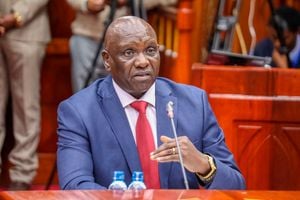Azimio’s options in a broad-based government plan

Azimio la Umoja leaders at a past press conference in SKM Center in Karen.
What you need to know:
- The youth feel excluded and neglected by the current regime.
- Azimio’s participation can reduce political tensions and unrest.
President William Ruto dismissed his entire Cabinet and stated that he would reconstitute a broad-based government composed of political formations and other stakeholders as a step towards addressing the underlying causes of the protests and build a more inclusive, stable and prosperous Kenya.
Political pundits argue that a broad-based government is necessary to address grievances arising from Gen Z-led protests.
The youth feel excluded and neglected by the current regime. President Ruto hopes that a broad-based government can ensure diverse voices and concerns are heard and addressed, reducing the feeling of marginalisation.
Involving leaders and experts from various ethnic, regional, religious, political, and social groups, a broad-based government can promote social cohesion that heals divisions and builds a shared identity and purpose.
Promote national unity
Whether Azimio should agree to or reject President Ruto's proposal to form a broad-based government depends on several factors and considerations.
Joining a broad-based government can help promote national unity and reconciliation, particularly in a politically polarised environment like Kenya.
In a broad-based government, Azimio can have a say in the formulation and implementation of government policies, ensuring that their supporters' interests and concerns are addressed. This will enhance the opposition's influence in policy-making and legislative processes.
A unified government can work more effectively to address economic and political challenges. Azimio’s participation can reduce political tensions and unrest, contributing to a more stable political climate.
Transparent political system
Azimio can also push for necessary political and electoral reforms within the government, potentially leading to a more transparent and fair political system.
However, there are cons to agreeing to join a broad-based government. Joining could be seen as compromising Azimio’s principles and political agenda, potentially alienating their political bases.
Azimio might also lose and dilute its distinct identity and become associated with the current administration’s unpopular actions and policies.
There is a risk that Azimio’s influence within the government could be limited, rendering their participation symbolic.
Key policies and reforms
The proposal of a broad-based government could also be a strategic move by President Ruto to weaken the opposition by co-opting its leaders, rather than a genuine attempt at inclusivity.
If Azimio considers agreeing, it will be wise to set clear conditions. The opposition coalition should ensure clear agreements on key policies and reforms that they would want to see implemented.
Azimio must consider power-sharing arrangements. The coalition should negotiate specific roles and responsibilities for its members within the government to ensure meaningful participation.
The opposition coalition should also maintain a degree of autonomy to continue advocating for their principles and holding the government accountable at all times.
Mr Okango is a political strategist, leadership, and governance expert





